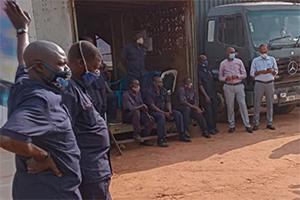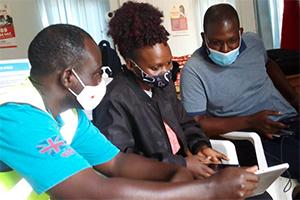Fighting a pandemic using Digital Contact Tracing in Uganda’s haulage industry
A new study fully documents the development of a Digital Contact Tracing tool for use on the African continent.

At the peak of Uganda’s first Covid-19 wave, much community spread was attributed to the interaction of haulage drivers with the communities that live along the road network.
In response to this route for potential disease spread, the government imposed a requirement for drivers at Uganda’s ports of entry and exit to demonstrate a negative Covid-19 PCR test result.
The delays caused by the testing processes brought the entire regional supply chain to a halt – by May 2020, haulage trucks were queued for up to 47 km at the Busia and Malaba border ports between Uganda and Kenya.
Although, new testing requirements were later implemented to reduce these delays, the situation highlighted the need to develop swift and more effective methods to control the spread of infection in the haulage sector.
New Digital Contact Tracing tool
In response, a team from the Roslin Institute and colleagues in Uganda, have now developed a digital contact tracing (DCT) prototype for use in the haulage sector. The multidisciplinary team – Tackling Haulage in East Africa – has consulted with key stakeholders to devise an open-source tool tailored to haulage use in developing countries.
The new protocol uses mobile phone technology to integrate data on the road network infrastructure, time-stamped geopositioning, and Covid-19 test result data of drivers, to increase both the speed and accuracy of public health contact tracing in the region.

Collecting stakeholder feedback
The THEA team are now rolling out a pilot study of the new DCT protocol to test its utility among truck drivers. The study will allow the research team to develop informative models that map the risk of Covid-19 disease and transmission, and also to estimate the contribution of haulage to Covid-19 epidemiology in Uganda.
The pilot will also collect feedback from truck drivers and other key participants, to review of potential benefits and limitations of DCT technology.
Importantly although the tool was developed specifically in response to the threat from the Covid-19 pandemic, this study will also inform the safe deployment of DCT technologies needed for combatting future pandemics in low-income countries.
The work was funded by the Medical Research Council and is published in BMJ Open.
Related links
Royal (Dick) School of Veterinary Studies
Tracking Haulage in East Africa to control COVID-19 (THEA)


